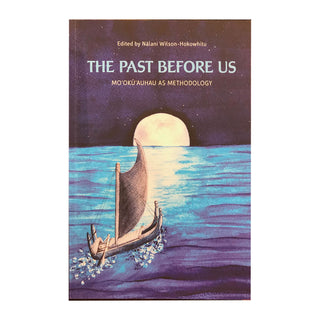The title of the book, The Past before Us, refers to the importance of ka wā mamua or “the time in front” in Hawaiian thinking. In this collection of essays, eleven Kanaka ‘Ōiwi (Native Hawaiian) scholars honor their mo‘okū‘auhau (geneaological lineage) by using genealogical knowledge drawn from the past to shape their research methodologies. These contributors, Kānaka writing from Hawai‘i as well as from the diaspora throughout the Pacific and North America, come from a wide range of backgrounds including activism, grassroots movements, and place-based cultural practice, in addition to academia. Their work offers broadly applicable yet deeply personal perspectives on complex Hawaiian issues and demonstrates that enduring ancestral ties and relationships to the past are not only relevant, but integral, to contemporary Indigenous scholarship. Chapters on language, literature, cosmology, spirituality, diaspora, identity, relationships, activism, colonialism, and cultural practices unite around methodologies based on mo‘okū‘auhau. This cultural concept acknowledges the times, people, places, and events that came before; it is a fundamental worldview that guides our understanding of the present and our navigation into the future.
_____
Edited by Nālani Wilson-Hokowhitu
_____
papaerback | 158 pages | 6" x 9" | B&W
The title of the book, The Past before Us, refers to the importance of ka wā mamua or “the time in front” in Hawaiian thinking. In this collection of essays, eleven Kanaka ‘Ōiwi (Native Hawaiian) scholars honor their mo‘okū‘auhau (geneaological lineage) by using genealogical knowledge drawn from the past to shape their research methodologies. These contributors, Kānaka writing from Hawai‘i as well as from the diaspora throughout the Pacific and North America, come from a wide range of backgrounds including activism, grassroots movements, and place-based cultural practice, in addition to academia. Their work offers broadly applicable yet deeply personal perspectives on complex Hawaiian issues and demonstrates that enduring ancestral ties and relationships to the past are not only relevant, but integral, to contemporary Indigenous scholarship. Chapters on language, literature, cosmology, spirituality, diaspora, identity, relationships, activism, colonialism, and cultural practices unite around methodologies based on mo‘okū‘auhau. This cultural concept acknowledges the times, people, places, and events that came before; it is a fundamental worldview that guides our understanding of the present and our navigation into the future.
_____
Edited by Nālani Wilson-Hokowhitu
_____
papaerback | 158 pages | 6" x 9" | B&W

